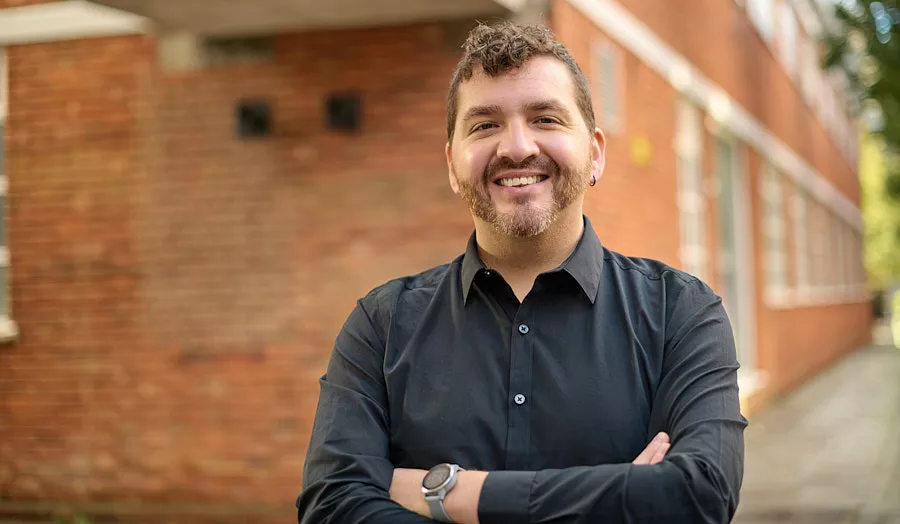Apply for this course
Please select when you would like to start:
Use the apply button to begin your application.
If you require a Student visa and wish to study a postgraduate course on a part-time basis, please read our how to apply information for international students to ensure you have all the details you need about the application process.
Why study this course?
Our Psychology of Mental Health MSc course is designed to provide you with advanced training in mental health. You'll gain an understanding of mental health law, safeguarding and working with vulnerable adults and children. You’ll also learn about how individuals cultivate resilience in the face of adversity and trauma.
You’ll enhance your clinical skills, including cognitive behavioural therapy (CBT) and motivational interviewing techniques, as well as learning meditation and mindfulness methods.
This course would be ideal if you're a psychology graduate wanting to strengthen your position to undergo clinical psychology or counselling psychology training. Further, it aims to develop the skills of those currently working in social/health care practice to support career progression.
Learn about every major aspect of psychology
You’ll enhance your clinical skills, including cognitive behavioural therapy (CBT) and motivational interviewing techniques, as well as learning meditation and mindfulness methods
Boost your career prospects
This course would be ideal if you're a psychology graduate wanting to strengthen your position to undergo clinical psychology or counselling psychology training
Take your career prospects to the next level
This course aims to develop the skills of those currently working in social/health care practice to support career progression
Course modules
The modules listed below are for the academic year 2024/25 and represent the course modules at this time. Modules and module details (including, but not limited to, location and time) are subject to change over time.
Year modules
Introduction to Skills Based Practice
This module currently runs:autumn semester - Thursday morning
(core, 20 credits)
This module is designed to equip you with a range of practical academic and professional skills enable you to study and conduct scientific research at postgraduate level in line with the principles of open science. It will provide opportunities for you to develop the reflective skills required for working in mental health settings. More specifically, through experiential learning methods, the module will equip you with: (1) core intellectual and academic skills to assist your progression through the course and into further study or employment (e.g., written and oral communication skills); (2) professional skills to prepare you for research methods and dissertation modules (e.g., numeracy skills; data management); (3) reflective skills required for employment in mental health settings; and (4) the ability to apply the skills developed in the module – along with your knowledge of ethics, research and specific clinical issues – in different academic and employment contexts. The module thus provides you with a firm foundation for your progression through the course and into further postgraduate training or employment in a range of social or healthcare professions.
Read full detailsPsychopathology
This module currently runs:autumn semester - Wednesday morning
(core, 20 credits)
This module will introduce you to core topics in psychopathology and clinical practice, including treatments for a range of mental health conditions and neuropsychological disorders. It will allow you to explore the nature of mental health conditions and neuropsychological disorders through biological, social, behavioural, and cognitive perspectives, as well as mental health service users’ experiences. You will learn how to diagnose and assess a range of mental health disorders and to appreciate how social and cultural factors can influence these practices. The module will utilise a variety of teaching and learning methods to provide an integrated and multidisciplinary approach to understanding psychopathology. These features will include introduction to formal classification systems such as the Diagnostic and Statistical Manual for Mental Disorders, 5th Edition (DSM-5) and skills in research and professional practice.
Read full detailsResearch Design and Analysis for Psychology
This module currently runs:spring semester - Thursday afternoon
(core, 20 credits)
The aim of this module is to introduce you to a wide range of methods of psychological investigation. You will learn how to design different types of psychological studies, create materials for data collection, collect and analyse data, summarise, and present results in line with professional publication standards and the principles of open science. You will learn how to manage and manipulate different types of data (qualitative and quantitative) and to conduct different types of data analysis using appropriate software where appropriate. The module will develop your ability to integrate and evaluate different lines of theory and research and to reflect on the ethical implications of different research methods in line with professional standards and principles of open science. Each of these aims is associated with general competencies that are highly valued in employment settings (e.g., communication, numeracy, data management, critical thinking).
Read full detailsResearch Project
This module currently runs:all year (September start) - Wednesday afternoon
summer studies
(core, 60 credits)
This module will support you with the process of planning, carrying out, and writing up an independent research project in psychology. You will be allocated a research supervisor who will guide you through each stage. The module equips you with the qualities and transferable skills necessary for completing a research project and which are essential for employment in different settings. This includes (1) independent study, self-management, time keeping, and digital literacy skills; (2) in-depth understanding of a selected topic; (3) critical thinking skills; (4) creative problem-solving skills; (5) ability and willingness to work with a supervisor and peers as a team; (6) understanding of the scientific method; (7) ability to collect valid and reliable data through an ethically sound process; (8) understanding of statistics and/or qualitative data analysis using appropriate software and platforms and ability to apply them to real data; (9) ability to write a complete report of research findings in line with professional publication standards; (10) ability to present research findings in different ways to different audiences.
Read full detailsResilience and Mindfulness
This module currently runs:spring semester - Thursday morning
(core, 20 credits)
This module will introduce you to core topics in the psychology of resilience and mindfulness. It will help to develop your understanding of the benefits of integrating resilience and mindfulness training and interventions into healthcare practices to support both clients’ and practitioners’ wellbeing and needs. It will explore the benefits of resilience and mindfulness interventions across the lifespan in the context of mental health, special needs, the healthcare system, at risk families and end of life issues from a cultural and systemic perspective. You will learn about family systems approaches in healthcare and explore the assessment of families, resilience, mental health promotion and empowering families towards making positive changes towards mental wellbeing. The knowledge and skills developed in the module will provide affirm foundation for employment in different healthcare settings.
Read full detailsSpecialised Clinical Issues in Mental Health Services
This module currently runs:autumn semester - Thursday afternoon
(core, 20 credits)
This module will develop your knowledge and understanding of a range of issues in mental health service provision and use. You will explore the experiences of those accessing mental health services, including barriers to accessing treatment (e.g., difficulties in identifying and communicating distress; stigmatising beliefs; preference for self-reliance) and the challenges experienced by clients within those services (e.g., cultural and gender differences; developing and maintaining therapeutic relationships), especially for those with specific diagnoses (e.g., depression; anxiety; and psychosis). You will be introduced to various theoretical, legal, and ethical frameworks that underpin service provision (e.g., Mental Health Act and Care Quality Commission Regulations). You will have opportunities to develop the skills that will help you to address many of the challenges faced by professionals working within those services (e.g., communication; managing client and family expectations; and workplace challenges such as violence and aggression). The knowledge and skills developed in this module will leave you well positioned to work successfully in different mental healthcare services.
Read full detailsTreatment Interventions
This module currently runs:spring semester - Wednesday morning
(core, 20 credits)
This module will develop your knowledge and understanding of evidence-based interventions used in mental health services (e.g., substance use; trauma; anxiety; psychological distress). This includes motivational interviewing, cognitive behavioural therapy, and other interventions for a range client needs (e.g., substance misuse and psychological distress). You will learn about the theoretical frameworks and research evidence on which these interventions are based and be able to apply them in different treatment contexts. You will also develop your understanding of ethical practice in the context of treatment interventions. These skills will help to prepare you for employment in different clinical and healthcare settings.
Read full details






.jpg)










